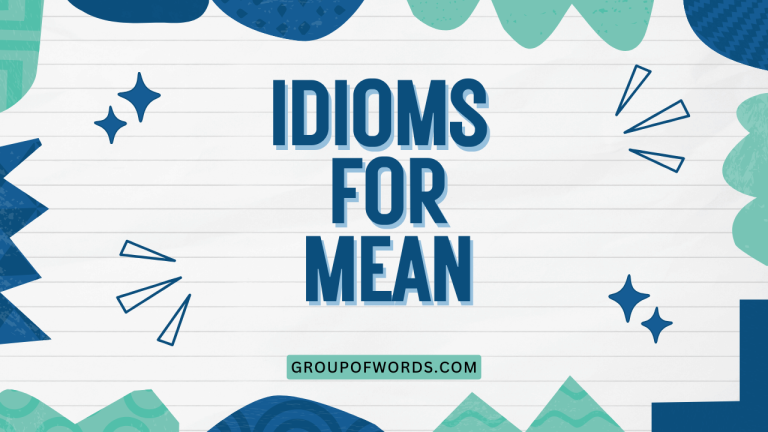Spice Up Your Speech: Idioms for Expressing Boredom
Boredom is a universal human experience. We’ve all been there – stuck in a monotonous meeting, enduring a tedious lecture, or simply feeling uninspired and restless.
While you could always say “I’m bored,” English offers a colorful array of idioms to express this feeling with flair and nuance. Mastering these idioms will not only enhance your vocabulary but also allow you to convey your boredom in a more engaging and relatable way.
This article is designed for English language learners of all levels, from beginners looking to expand their vocabulary to advanced speakers aiming to refine their expressive abilities. By exploring these idioms, you’ll gain a deeper understanding of English and its expressive capabilities.
This comprehensive guide will delve into the world of idioms for expressing boredom, providing definitions, examples, usage rules, and practice exercises to help you master this aspect of the English language. Whether you’re preparing for an English exam, aiming to improve your conversational skills, or simply curious about the richness of the English language, this article will equip you with the tools you need to express boredom like a native speaker.
Table of Contents
- Definition of Idioms for Boredom
- Structural Breakdown of Boredom Idioms
- Types and Categories of Boredom Idioms
- Examples of Boredom Idioms
- Usage Rules for Boredom Idioms
- Common Mistakes with Boredom Idioms
- Practice Exercises
- Advanced Topics: Nuances and Regional Variations
- Frequently Asked Questions
- Conclusion
Definition of Idioms for Boredom
An idiom is a phrase or expression whose meaning cannot be understood from the ordinary meanings of the words in it. In other words, idioms are figurative expressions that have a meaning different from the literal meaning of the individual words.
Idioms for boredom are expressions used to convey a state of being uninterested, weary, or restless due to a lack of stimulation. These idioms add color and personality to your language, allowing you to express your feelings in a more vivid and engaging way.
These idioms can be classified based on their structure and the specific nuance of boredom they convey. Some idioms focus on the feeling of monotony, others on the lack of excitement, and still others on the desire for something more stimulating.
The function of these idioms is to provide a more expressive and relatable way to describe boredom, making your communication more effective and engaging.
The context in which you use these idioms is crucial. Some idioms are more formal and appropriate for professional settings, while others are more casual and suitable for conversations with friends and family.
Understanding the context will help you choose the right idiom to express your boredom effectively without causing offense or sounding out of place.
Structural Breakdown of Boredom Idioms
Boredom idioms, like all idioms, do not follow a strict grammatical structure. Their meaning is derived from the phrase as a whole, rather than the individual words.
However, we can analyze their structure to understand how they function.
Many boredom idioms involve verbs combined with prepositions (phrasal verbs) or nouns combined with adjectives. For example, “to be bored stiff” uses an adjective to intensify the feeling of boredom.
Other idioms might use metaphors or similes to create a vivid image of boredom, such as “watching paint dry,” which implies an activity is incredibly slow and uninteresting.
Understanding the structural elements of these idioms, even if they don’t follow standard grammatical rules, can help you remember and use them more effectively. Pay attention to the individual words and how they combine to create a unique meaning.
Consider the imagery and metaphors used in the idioms, as these often provide clues to their intended meaning.
Types and Categories of Boredom Idioms
Boredom idioms can be categorized based on the specific aspect of boredom they emphasize. Here are some common categories:
1. General Boredom
These idioms express a general feeling of being bored without specifying a particular cause or activity. They are versatile and can be used in a variety of situations.
2. Boredom with an Activity
These idioms describe boredom that arises from engaging in a specific activity or task. They highlight the monotony or lack of interest in the activity itself.
3. Boredom with a Place
These idioms express boredom associated with a particular location or environment. They suggest that the place is uninspiring or lacks excitement.
4. Boredom with a Person
These idioms describe boredom that stems from interacting with a specific person. They imply that the person is dull, uninteresting, or repetitive.
5. Boredom with a Situation
These idioms express boredom arising from a specific situation or circumstance. They suggest the situation is tedious, unstimulating, or predictable.
Examples of Boredom Idioms
This section provides a comprehensive list of boredom idioms, categorized for clarity. Each idiom is accompanied by a definition and example sentences to illustrate its usage.
General Boredom
The following table provides examples of idioms that express general boredom. These idioms are versatile and can be used in various contexts to convey a broad sense of being uninterested or weary.
| Idiom | Definition | Example Sentence(s) |
|---|---|---|
| Bored stiff | Extremely bored. | I was bored stiff during the entire lecture. She said she was bored stiff just sitting around all day. |
| Bored to death | Extremely bored; so bored that one feels like dying. | He was bored to death waiting for the train. After an hour of the presentation, I was bored to death. |
| Bored out of my mind | Extremely bored; feeling a severe lack of mental stimulation. | I’m bored out of my mind; let’s do something fun. She said she was bored out of her mind during the long car ride. |
| Fed up to the back teeth | Extremely annoyed or bored with something. | I’m fed up to the back teeth with this job. He was fed up to the back teeth of hearing the same complaints every day. |
| Had it up to here | To have reached the limit of one’s patience or tolerance, often due to boredom or frustration. | I’ve had it up to here with this monotonous routine. She’s had it up to here with his constant complaining. |
| In a rut | Stuck in a monotonous routine. | I feel like I’m in a rut; I need to try something new. He realized he was in a rut and decided to take a vacation. |
| Nothing to write home about | Not particularly exciting or interesting. | The movie was nothing to write home about. The food at the restaurant was nothing to write home about, just average. |
| Tired of the same old thing | Wanting something different or new. | I’m tired of the same old thing; let’s go somewhere different. She was tired of the same old thing, so she decided to redecorate her house. |
| Ho-hum | Expressing boredom or lack of enthusiasm. | “Another meeting,” he sighed, “ho-hum.” The movie was quite ho-hum, I almost fell asleep. |
| Dying on the vine | To be neglected or forgotten, leading to a decline in interest or excitement. | The project is dying on the vine because no one is paying attention to it. The relationship started to die on the vine after they stopped communicating. |
| At a loose end | Having nothing particular to do; bored. | I’m at a loose end this afternoon; do you want to hang out? She was at a loose end during the summer vacation. |
| Restless feet | A desire to travel or do something different due to boredom. | I’ve got restless feet; I need to go on an adventure. He always had restless feet and was never content staying in one place. |
| Going stir-crazy | To become anxious or stressed from being confined or inactive. | After being stuck inside for days, I started going stir-crazy. She was going stir-crazy from being quarantined. |
| In the doldrums | In a state of inactivity or stagnation; bored. | The company was in the doldrums due to the economic downturn. After the excitement of the holidays, I felt in the doldrums. |
| Stuck in a groove | To be in a monotonous routine, similar to being in a rut. | I feel like I’m stuck in a groove and need to shake things up. He realized he was stuck in a groove at work. |
| Same old, same old | The same routine or situation, often implying boredom. | “How’s work?” “Same old, same old.” The days at the office were always same old, same old. |
| Bored senseless | Extremely bored, to the point of losing awareness. | The lecture was so dull that I was bored senseless. He said he was bored senseless during the long flight. |
| Watching the grass grow | Engaged in a very boring or slow activity. | Waiting for the report felt like watching the grass grow. He said waiting for the software to update was like watching the grass grow. |
| Twiddling my thumbs | To do nothing, often out of boredom or impatience. | I was just twiddling my thumbs waiting for the meeting to start. She was twiddling her thumbs because there was nothing to do. |
| Like watching paint dry | Extremely boring or slow. | The presentation was like watching paint dry. The process of filling out the forms was like watching paint dry. |
Boredom with an Activity
The subsequent table contains idioms used to express boredom specifically related to an activity. These idioms highlight the lack of engagement or interest in the task at hand.
| Idiom | Definition | Example Sentence(s) |
|---|---|---|
| A drag | Something boring or tedious. | This paperwork is such a drag. The long commute to work is always a drag. |
| A snooze fest | A very boring or dull event or activity. | The conference was a snooze fest; I almost fell asleep. The lecture turned out to be a snooze fest. |
| Mind-numbing | Extremely boring or repetitive. | The data entry job was mind-numbing. He found the task of sorting files mind-numbing. |
| Tedious as hell | Extremely boring and tiresome. | Cleaning the attic is tedious as hell. The process of updating the software manually was tedious as hell. |
| Soul-destroying | Extremely boring and depressing. | The repetitive tasks at work were soul-destroying. He found the job of cold-calling potential customers soul-destroying. |
| Like pulling teeth | Very difficult and tedious, especially when trying to get someone to do something. | Getting him to agree to the plan was like pulling teeth. Trying to get her to talk about her feelings is like pulling teeth. |
| Heavy going | Difficult or boring. | The book was heavy going, I couldn’t finish it. The project turned out to be heavy going due to unexpected challenges. |
| A dead loss | A complete waste of time or effort. | The training session was a dead loss; I learned nothing. Spending the day trying to fix the old computer was a dead loss. |
| A waste of space | Something or someone that is useless or boring. | That old machine is just a waste of space. He felt like a waste of space because he couldn’t contribute to the project. |
| Clock-watching | Constantly looking at the clock because one is bored and eager to leave. | I was clock-watching all afternoon, waiting for the end of the shift. She admitted she was clock-watching during the boring meeting. |
| Like banging your head against a brick wall | A frustrating and futile activity. | Trying to explain the concept to him was like banging your head against a brick wall. Arguing with her about the issue was like banging your head against a brick wall. |
| Going through the motions | Doing something without enthusiasm or genuine interest. | He was just going through the motions at work because he was bored. She was going through the motions during the practice session. |
| Churning butter | Engaging in a repetitive and unproductive activity. | It felt like we were just churning butter and not making any progress. Working on the outdated system felt like churning butter. |
| Beating a dead horse | Wasting time or effort on something that is already finished or cannot be changed. | Arguing about the decision now is just beating a dead horse. Trying to revive the old project is like beating a dead horse. |
| Running in circles | Engaging in activity that leads nowhere; unproductive. | We’re just running in circles trying to solve this problem. They felt like they were running in circles trying to get the project approved. |
| Chewing the fat | Engaging in casual, often aimless, conversation. (While not always negative, it can imply boredom if there’s nothing productive happening.) | They were just chewing the fat in the break room, killing time. We spent the afternoon chewing the fat instead of working on the presentation. |
| Plodding along | To proceed slowly and laboriously, often without enthusiasm. | We were just plodding along with the project, making slow progress. The team was plodding along despite the lack of motivation. |
| Marking time | To do something without making any real progress, just to pass the time. | We were just marking time until the end of the day. The interns were marking time by doing simple tasks. |
| Droning on | To talk in a monotonous and boring way. | The speaker was droning on, and everyone started to lose interest. The teacher was droning on about the same topic for hours. |
| Grinding away | To work hard at something tedious and unrewarding. | He was grinding away at the same task day after day. She felt like she was grinding away at a job she didn’t enjoy. |
Boredom with a Place
The following table lists idioms that express boredom associated with a particular place. These idioms suggest that the location is uninteresting or lacks excitement.
| Idiom | Definition | Example Sentence(s) |
|---|---|---|
| A one-horse town | A small, uninteresting town with little to do. | This town is a one-horse town; there’s nothing to do here. He grew up in a one-horse town and always dreamed of moving to the city. |
| The back of beyond | A remote and isolated place, often considered boring. | They live in the back of beyond; it takes hours to get there. He felt isolated living in the back of beyond. |
| In the middle of nowhere | A remote and isolated place, with nothing of interest nearby. | We got lost and ended up in the middle of nowhere. She didn’t want to live in the middle of nowhere. |
| A dead end | A place or situation with no prospects or opportunities. | This job feels like a dead end; I need to find something new. He realized his career path was a dead end. |
| A cultural desert | A place that lacks cultural activities or opportunities. | The town was a cultural desert; there were no museums or theaters. She moved from the city because it had become a cultural desert. |
| Out of the way | A place that is remote and not easily accessible. | The cabin was out of the way, far from any towns or cities. They wanted to find a place that was out of the way and peaceful. |
| A sleepy hollow | A quiet, inactive, and often boring place. | The village was a sleepy hollow, where nothing ever happened. He grew up in a sleepy hollow and longed for excitement. |
| Off the beaten path | A place that is not well-known or frequently visited. | They went off the beaten path and discovered a hidden beach. He wanted to find a restaurant that was off the beaten path. |
| The sticks | A rural or remote area, often considered boring or unsophisticated. | They moved to the sticks to escape the city. She didn’t want to live in the sticks because she preferred city life. |
| A hole in the wall | A small, often uninteresting or run-down place. | The restaurant was just a hole in the wall, but the food was amazing. He found a hole in the wall where he could relax and read. |
| In the boondocks | A remote or rural area, often considered boring or unsophisticated. | They lived in the boondocks, far from any major cities. She didn’t want to raise her children in the boondocks. |
| The boonies | Similar to “the boondocks,” a remote or rural area. | He grew up in the boonies and learned to appreciate nature. They decided to build their cabin in the boonies. |
| A backwater | A place that is stagnant or isolated, often considered boring. | The town felt like a backwater; nothing ever changed. She wanted to leave the backwater and explore the world. |
| A dead zone | A place where nothing interesting or exciting happens. | The office felt like a dead zone; there was no creativity or enthusiasm. He tried to avoid spending too much time in the dead zone. |
| A ghost town | A town that is deserted and lifeless, often due to economic decline. | The old mining town had become a ghost town. After the factory closed, the town turned into a ghost town. |
| A forgotten corner of the world | A place that is remote and overlooked, often considered boring. | The village seemed like a forgotten corner of the world. They stumbled upon a forgotten corner of the world during their travels. |
| Nowheresville | A place that is insignificant and uninteresting. | He didn’t want to end up living in Nowheresville. She dreamed of escaping Nowheresville and making a name for herself. |
| The boonies | (Same as above) A remote or rural area. | They decided to spend their vacation in the boonies. He found peace and quiet living in the boonies. |
| A backwater | (Same as above) A place that is stagnant or isolated. | The small town felt like a backwater, with little opportunity. She wanted to leave the backwater and pursue her dreams. |
| Podunk | A small, unimportant town or area. | He grew up in Podunk and always felt like an outsider. They didn’t want to settle down in Podunk. |
Boredom with a Person
The subsequent table includes idioms that are used to express boredom associated with a person. These idioms imply that the person is dull, uninteresting, or repetitive.
| Idiom | Definition | Example Sentence(s) |
|---|---|---|
| A wet blanket | A person who spoils other people’s fun by being negative or unenthusiastic. | Don’t invite him; he’s such a wet blanket. She didn’t want to be a wet blanket, but she couldn’t pretend to be excited. |
| A bore | A person who is dull and uninteresting. | He’s such a bore; he only talks about himself. She tried to avoid him because he was a bore. |
| A drag | A person who is boring or unpleasant to be around. | She didn’t want to invite him because he’s such a drag. He felt like a drag at the party because he didn’t know anyone. |
| A broken record | A person who repeats the same thing over and over again. | He’s like a broken record; he keeps saying the same thing. She felt like a broken record repeating the same instructions. |
| A dullard | A slow or stupid person. | He’s such a dullard; he never understands anything. She didn’t want to be seen as a dullard. |
| A stick-in-the-mud | A person who is unwilling to try new things or have fun. | He’s such a stick-in-the-mud; he never wants to go out. She didn’t want to be known as a stick-in-the-mud. |
| A party pooper | A person who spoils the fun at a party or gathering. | Don’t be a party pooper; join in the fun. She didn’t want to be a party pooper, but she was too tired to dance. |
| A killjoy | A person who deliberately spoils the enjoyment of others. | He’s such a killjoy; he always finds something to complain about. She tried not to be a killjoy, but she couldn’t hide her disappointment. |
| A stuffed shirt | A pompous and formal person, often considered boring. | He’s such a stuffed shirt; he’s always so serious. She didn’t want to be seen as a stuffed shirt. |
| A fuddy-duddy | An old-fashioned and boring person. | He’s such a fuddy-duddy; he doesn’t understand modern trends. She didn’t want to be labeled as a fuddy-duddy. |
| A square | A person who is conventional and boring. | He’s such a square; he never takes risks. She didn’t want to be seen as a square. |
| A drip | A boring or weak person. | He’s such a drip; he never stands up for himself. She didn’t want to be known as a drip. |
| A drone | A person who talks in a monotonous and boring way. | He’s such a drone; his lectures are so boring. She tried to avoid listening to the drone. |
| A windbag | A person who talks at length but says little of value. | He’s such a windbag; he can talk for hours without saying anything. She tried to politely interrupt the windbag. |
| A chatterbox | A person who talks incessantly, often about trivial matters. | She’s such a chatterbox; she never stops talking. He found the chatterbox exhausting. |
| A motormouth | A person who talks very quickly and incessantly. | He’s such a motormouth; it’s hard to understand him. She couldn’t keep up with the motormouth. |
| A blatherskite | A person who talks foolishly at length. | He’s such a blatherskite; his stories are ridiculous. She tried to ignore the blatherskite. |
| A gasbag | Similar to a windbag, a person who talks at length but says little of value. | He’s such a gasbag; he just loves to hear himself talk. She tuned out the gasbag. |
| A know-it-all | A person who acts as if they know everything, often in a boring or annoying way. | He’s such a know-it-all; he always has to correct everyone. She tried to avoid the know-it-all. |
| A pedant | A person who is excessively concerned with minor details and rules, often in a boring way. | He’s such a pedant; he always corrects my grammar. She found the pedant irritating. |
Boredom with a Situation
This table provides idioms that express boredom arising from a specific situation or circumstance. These idioms suggest that the situation is tedious, unstimulating, or predictable.
| Idiom | Definition | Example Sentence(s) | |
|---|---|---|---|
| A vicious cycle | A situation where one problem leads to another, creating a repetitive and often boring pattern. | The company was stuck in a vicious cycle of low sales and budget cuts. He felt trapped in a vicious cycle of debt and unemployment. | |
| The daily grind | The monotonous routine of everyday life. | I’m tired of the daily grind; I need a vacation. She wanted to escape the daily grind and pursue her passions. | |
| Same old story | A situation that is predictable and uninteresting because it happens repeatedly. | It’s the same old story: he’s late again. She was tired of hearing the same old story. | |
| A never-ending story | A situation that seems to continue indefinitely, often in a boring or frustrating way. | The project felt like a never-ending story; it just kept dragging on. The repairs on the house became a never-ending story. | |
| Stuck in a time warp | Feeling as though time is standing still or that one is reliving the same experiences repeatedly. | Living in this small town feels like being stuck in a time warp. He felt like he was stuck in a time warp, doing the same thing every day. | |
| A broken record | (Same as above but applied to a situation) A situation that repeats itself endlessly. | The arguments were like a broken record, always the same issues. The complaints about the service became a broken record. | |
| Going nowhere fast | Making little or no progress, leading to a feeling of boredom and frustration. | We’re going nowhere fast with this project; we need a new approach. He felt like he was going nowhere fast in his career. | |
| A dead end job | A job with no prospects for advancement or growth. | She quit her dead end job to pursue her dreams. He didn’t want to get stuck in a dead end job. | |
| The rat race | A competitive and stressful lifestyle, often involving long hours and little satisfaction. | He decided to leave the rat race and move to the country. She was tired of the rat race and wanted a simpler life. | |
| A hamster wheel | A situation where one is constantly busy but making no real progress. | He felt like he was on a hamster wheel, constantly working but getting nowhere. She was tired of running on a hamster wheel. | |
| A Catch-22 | A paradoxical situation where one is trapped by contradictory rules or conditions. | It was a Catch-22: he needed experience to get the job, but he couldn’t get experience without the job. She found herself in a Catch-22. | |
| A Groundhog Day situation | A situation where one relives the same day or experiences repeatedly. | Every day felt like a Groundhog Day situation. He felt like he was living in a Groundhog Day situation. | |
| The same old grind | Similar to “the daily grind,” the monotonous routine of everyday life. | He was tired of the same old grind and wanted a change. She felt stuck in the same old grind. | |
| A humdrum existence | A life that is dull and unexciting. | She didn’t want to lead a humdrum existence. He was bored with his humdrum existence. | |
| A life in the slow lane | A life that is calm and unhurried, but potentially boring. | He decided to take a life in the slow lane after retiring. She found a life in the slow lane peaceful but sometimes boring. | |
| A rut | (Same as above but applied to a situation) A fixed and monotonous routine. | He felt stuck in a rut at work. She wanted to break out of her rut. | |
| A monotonous cycle | A repetitive and uninteresting sequence of events. | The job involved a monotonous cycle of tasks. She hated the monotonous cycle of her daily routine. | |
| A treadmill | A situation where one is constantly working hard but making little progress. | He felt like he was on a treadmill, working harder and harder but getting nowhere. She was tired of running on a treadmill. | |
| A lack | A lack of stimulation | A situation that is uninteresting and uninspiring. | The town suffered from a lack of stimulation. He felt there was a lack of stimulation in his job. |
| A nine-to-five existence | A regular, often monotonous, work routine. | He was tired of a nine-to-five existence and wanted to start his own business. She found a nine-to-five existence boring. |
Usage Rules for Boredom Idioms
Using idioms correctly requires an understanding of their specific meanings and contexts. Here are some general rules to follow when using boredom idioms:
- Understand the Meaning: Make sure you fully understand the meaning of the idiom before using it. Using an idiom incorrectly can lead to confusion or miscommunication.
- Consider the Context: Choose idioms that are appropriate for the context. Some idioms are more formal and suitable for professional settings, while others are more casual and appropriate for conversations with friends and family.
- Know Your Audience: Be aware of your audience’s familiarity with idioms. If you are speaking to non-native English speakers, it’s best to use idioms sparingly or explain their meanings.
- Use Naturally: Incorporate idioms naturally into your speech or writing. Avoid forcing idioms into sentences where they don’t fit.
- Vary Your Language: While idioms can add color to your language, don’t overuse them. Vary your language by using a mix of idioms and literal expressions.
Correct: “I was bored stiff during the conference call.”
Incorrect: “I was bored stiff to the grocery store.” (This doesn’t make sense because “bored stiff” refers to a feeling, not a place.)
Common Mistakes with Boredom Idioms
Even advanced English learners can make mistakes when using idioms. Here are some common mistakes to avoid:
- Literal Interpretation: Avoid interpreting idioms literally. Remember that idioms have figurative meanings that are different from the literal meanings of the individual words.
- Incorrect Word Order: Pay attention to the correct word order of the idiom. Changing the word order can alter the meaning or make the idiom nonsensical.
- Overusing Idioms: Using too many idioms in a short period can make your speech sound unnatural or forced.
- Using Inappropriate Idioms: Be mindful of the context and audience when choosing idioms. Using a casual idiom in a formal setting can be inappropriate.
- Misunderstanding Connotations: Some idioms have negative connotations. Be aware of these connotations and use the idioms appropriately.
Mistake: “He is a wet towel.” (Incorrect – should be “a wet blanket”)
Correct: “He is a wet blanket.”
Practice Exercises
Test your understanding of boredom idioms with these practice exercises. Fill in the blanks with the appropriate idiom from the list below:
Idiom List:
- Bored to death
- A snooze fest
- A one-horse town
- A broken record
- Going through the motions
- The movie was such __________, I almost fell asleep.
Answer: a snooze fest - I’m __________ with this job; I need to find something new.
Answer: bored to death - This town is __________, there’s nothing to do here.
Answer: a one-horse town - He’s like __________, he keeps saying the same thing over and over.
Answer: a broken record - He was just __________ at work because he was bored.
Answer: going through the motions
Exercise 2: Rewrite the following sentences using a boredom idiom:
- I am extremely bored with this lecture.
Answer: I am bored stiff with this lecture. / I am bored to death with this lecture. - The job is very repetitive and uninteresting.
Answer: The job is mind-numbing. - This town is small and uninteresting.
Answer: This town is a one-horse town. - He is a person who spoils all the fun.
Answer: He is a wet blanket. / He is a party pooper. - We are not making any progress on this project.
Answer: We are going nowhere fast with this project.
Advanced Topics: Nuances and Regional Variations
Boredom idioms, like all idioms, can have subtle nuances and regional variations. Some idioms may be more common in certain regions or social groups.
For example, “fed up to the back teeth” is more common in British English than in American English.
Additionally, the connotations of boredom idioms can vary depending on the context and tone of voice. Some idioms may be more humorous or sarcastic, while others may be more serious or critical.
Pay attention to these nuances to use the idioms effectively.
Exploring these advanced topics will help you refine your understanding of boredom idioms and use them with greater precision and confidence.
Frequently Asked Questions
What is the difference between an idiom and a literal expression?
An idiom is a phrase or expression whose meaning cannot be understood from the ordinary meanings of the words in it. A literal expression, on the other hand, means exactly what the words say.
Why should I use idioms in my English?
Using idioms can make your English sound more natural, expressive, and engaging. Idioms can also convey complex feelings and ideas in a concise and memorable way.
How can I learn more idioms?
You can learn more idioms by reading books, watching movies, listening to podcasts, and practicing conversations with native English speakers. Pay attention to the context in which idioms are used and try to incorporate them into your own speech and writing.
Are idioms the same in all English-speaking countries?
No, idioms can vary by region. Some idioms are more common in certain countries or areas than others.
Be aware of these regional variations and use idioms that are appropriate for your audience.
Is it okay to use idioms in formal writing?
It depends on the specific idiom and the tone of your writing. Some idioms are too casual for formal writing, while others can be used effectively to add color and emphasis.
Use your judgment and consider your audience.
Conclusion
Mastering idioms for expressing boredom can significantly enhance your English language skills. By understanding the meanings, usage rules, and common mistakes associated with these idioms, you can communicate more effectively and engagingly.
Whether you’re describing a tedious activity, an uninspiring place, or a dull person, these idioms provide a colorful and expressive way to convey your feelings. Continue to practice and explore new idioms to expand your vocabulary and refine your language skills.
With dedication and practice, you’ll be able to express boredom like a native speaker and add a touch of flair to your conversations.






